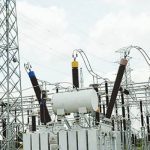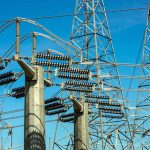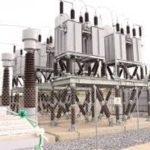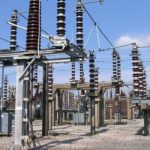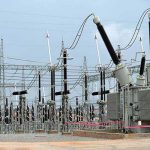The Transmission Company of Nigeria (TCN) says it has restored the national grid which experienced system disturbance at about 11.27am on Wednesday.
According to a statement by its General Manager, Public Affairs, the incident was as a result of sudden drop in system frequency from 49.94Hz to 47.36Hz, which created system instability.
The statement further added that reports obtained from the National Control Centre (NCC) indicate that it was precipitated by the tripping of a Unit (with a load of 106 MW) in one of the generating stations due to “Exhaust over Temperature”.
“This unwholesome event, which pulled out other grid-connected Units in the plant, resulted in aggregated generation loss of 457MW. In its wake, a train of events ensued – culminating in the collapse of the national grid.
“As obtainable in all systems, when a component of the electric power system is defective, the entire configuration is vitiated. However, inspite of setbacks encountered at the initial stage, grid restoration had almost been completed as at 11:00pm when this report was filed.
“The Nigerian Electricity Supply Industry appreciates the kind understanding of Government and consumers of electricity within and outside the country. We are committed to leveraging the concerted interventions instituted thus far to enhance power supply reliability so that the issue of system collapse will soon become a thing of the past.
“Meanwhile, a full-scale investigation is being conducted to establish the cause of this failure,” the statement said.
The Transmission Company of Nigeria (TCN) says it has restored the national grid which experienced system disturbance at about 11.27am on Wednesday.
According to a statement by its General Manager, Public Affairs, the incident was as a result of sudden drop in system frequency from 49.94Hz to 47.36Hz, which created system instability.
The statement further added that reports obtained from the National Control Centre (NCC) indicate that it was precipitated by the tripping of a Unit (with a load of 106 MW) in one of the generating stations due to “Exhaust over Temperature”.
“This unwholesome event, which pulled out other grid-connected Units in the plant, resulted in aggregated generation loss of 457MW. In its wake, a train of events ensued – culminating in the collapse of the national grid.
“As obtainable in all systems, when a component of the electric power system is defective, the entire configuration is vitiated. However, inspite of setbacks encountered at the initial stage, grid restoration had almost been completed as at 11:00pm when this report was filed.
“The Nigerian Electricity Supply Industry appreciates the kind understanding of Government and consumers of electricity within and outside the country. We are committed to leveraging the concerted interventions instituted thus far to enhance power supply reliability so that the issue of system collapse will soon become a thing of the past.
“Meanwhile, a full-scale investigation is being conducted to establish the cause of this failure,” the statement said.
The Transmission Company of Nigeria (TCN) says it has restored the national grid which experienced system disturbance at about 11.27am on Wednesday.
According to a statement by its General Manager, Public Affairs, the incident was as a result of sudden drop in system frequency from 49.94Hz to 47.36Hz, which created system instability.
The statement further added that reports obtained from the National Control Centre (NCC) indicate that it was precipitated by the tripping of a Unit (with a load of 106 MW) in one of the generating stations due to “Exhaust over Temperature”.
“This unwholesome event, which pulled out other grid-connected Units in the plant, resulted in aggregated generation loss of 457MW. In its wake, a train of events ensued – culminating in the collapse of the national grid.
“As obtainable in all systems, when a component of the electric power system is defective, the entire configuration is vitiated. However, inspite of setbacks encountered at the initial stage, grid restoration had almost been completed as at 11:00pm when this report was filed.
“The Nigerian Electricity Supply Industry appreciates the kind understanding of Government and consumers of electricity within and outside the country. We are committed to leveraging the concerted interventions instituted thus far to enhance power supply reliability so that the issue of system collapse will soon become a thing of the past.
“Meanwhile, a full-scale investigation is being conducted to establish the cause of this failure,” the statement said.
The Transmission Company of Nigeria (TCN) says it has restored the national grid which experienced system disturbance at about 11.27am on Wednesday.
According to a statement by its General Manager, Public Affairs, the incident was as a result of sudden drop in system frequency from 49.94Hz to 47.36Hz, which created system instability.
The statement further added that reports obtained from the National Control Centre (NCC) indicate that it was precipitated by the tripping of a Unit (with a load of 106 MW) in one of the generating stations due to “Exhaust over Temperature”.
“This unwholesome event, which pulled out other grid-connected Units in the plant, resulted in aggregated generation loss of 457MW. In its wake, a train of events ensued – culminating in the collapse of the national grid.
“As obtainable in all systems, when a component of the electric power system is defective, the entire configuration is vitiated. However, inspite of setbacks encountered at the initial stage, grid restoration had almost been completed as at 11:00pm when this report was filed.
“The Nigerian Electricity Supply Industry appreciates the kind understanding of Government and consumers of electricity within and outside the country. We are committed to leveraging the concerted interventions instituted thus far to enhance power supply reliability so that the issue of system collapse will soon become a thing of the past.
“Meanwhile, a full-scale investigation is being conducted to establish the cause of this failure,” the statement said.
The Transmission Company of Nigeria (TCN) says it has restored the national grid which experienced system disturbance at about 11.27am on Wednesday.
According to a statement by its General Manager, Public Affairs, the incident was as a result of sudden drop in system frequency from 49.94Hz to 47.36Hz, which created system instability.
The statement further added that reports obtained from the National Control Centre (NCC) indicate that it was precipitated by the tripping of a Unit (with a load of 106 MW) in one of the generating stations due to “Exhaust over Temperature”.
“This unwholesome event, which pulled out other grid-connected Units in the plant, resulted in aggregated generation loss of 457MW. In its wake, a train of events ensued – culminating in the collapse of the national grid.
“As obtainable in all systems, when a component of the electric power system is defective, the entire configuration is vitiated. However, inspite of setbacks encountered at the initial stage, grid restoration had almost been completed as at 11:00pm when this report was filed.
“The Nigerian Electricity Supply Industry appreciates the kind understanding of Government and consumers of electricity within and outside the country. We are committed to leveraging the concerted interventions instituted thus far to enhance power supply reliability so that the issue of system collapse will soon become a thing of the past.
“Meanwhile, a full-scale investigation is being conducted to establish the cause of this failure,” the statement said.
The Transmission Company of Nigeria (TCN) says it has restored the national grid which experienced system disturbance at about 11.27am on Wednesday.
According to a statement by its General Manager, Public Affairs, the incident was as a result of sudden drop in system frequency from 49.94Hz to 47.36Hz, which created system instability.
The statement further added that reports obtained from the National Control Centre (NCC) indicate that it was precipitated by the tripping of a Unit (with a load of 106 MW) in one of the generating stations due to “Exhaust over Temperature”.
“This unwholesome event, which pulled out other grid-connected Units in the plant, resulted in aggregated generation loss of 457MW. In its wake, a train of events ensued – culminating in the collapse of the national grid.
“As obtainable in all systems, when a component of the electric power system is defective, the entire configuration is vitiated. However, inspite of setbacks encountered at the initial stage, grid restoration had almost been completed as at 11:00pm when this report was filed.
“The Nigerian Electricity Supply Industry appreciates the kind understanding of Government and consumers of electricity within and outside the country. We are committed to leveraging the concerted interventions instituted thus far to enhance power supply reliability so that the issue of system collapse will soon become a thing of the past.
“Meanwhile, a full-scale investigation is being conducted to establish the cause of this failure,” the statement said.
The Transmission Company of Nigeria (TCN) says it has restored the national grid which experienced system disturbance at about 11.27am on Wednesday.
According to a statement by its General Manager, Public Affairs, the incident was as a result of sudden drop in system frequency from 49.94Hz to 47.36Hz, which created system instability.
The statement further added that reports obtained from the National Control Centre (NCC) indicate that it was precipitated by the tripping of a Unit (with a load of 106 MW) in one of the generating stations due to “Exhaust over Temperature”.
“This unwholesome event, which pulled out other grid-connected Units in the plant, resulted in aggregated generation loss of 457MW. In its wake, a train of events ensued – culminating in the collapse of the national grid.
“As obtainable in all systems, when a component of the electric power system is defective, the entire configuration is vitiated. However, inspite of setbacks encountered at the initial stage, grid restoration had almost been completed as at 11:00pm when this report was filed.
“The Nigerian Electricity Supply Industry appreciates the kind understanding of Government and consumers of electricity within and outside the country. We are committed to leveraging the concerted interventions instituted thus far to enhance power supply reliability so that the issue of system collapse will soon become a thing of the past.
“Meanwhile, a full-scale investigation is being conducted to establish the cause of this failure,” the statement said.
The Transmission Company of Nigeria (TCN) says it has restored the national grid which experienced system disturbance at about 11.27am on Wednesday.
According to a statement by its General Manager, Public Affairs, the incident was as a result of sudden drop in system frequency from 49.94Hz to 47.36Hz, which created system instability.
The statement further added that reports obtained from the National Control Centre (NCC) indicate that it was precipitated by the tripping of a Unit (with a load of 106 MW) in one of the generating stations due to “Exhaust over Temperature”.
“This unwholesome event, which pulled out other grid-connected Units in the plant, resulted in aggregated generation loss of 457MW. In its wake, a train of events ensued – culminating in the collapse of the national grid.
“As obtainable in all systems, when a component of the electric power system is defective, the entire configuration is vitiated. However, inspite of setbacks encountered at the initial stage, grid restoration had almost been completed as at 11:00pm when this report was filed.
“The Nigerian Electricity Supply Industry appreciates the kind understanding of Government and consumers of electricity within and outside the country. We are committed to leveraging the concerted interventions instituted thus far to enhance power supply reliability so that the issue of system collapse will soon become a thing of the past.
“Meanwhile, a full-scale investigation is being conducted to establish the cause of this failure,” the statement said.



